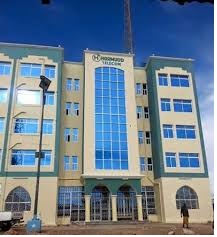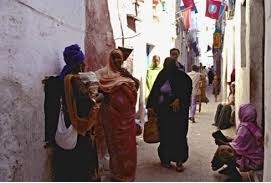By Hassan M. Abukar
Al-Shabaab has become the big elephant in today’s Somalia—and it’s a force to be reckoned with. While the organization was dislodged militarily from Mogadishu several years ago, it still maintains a sinister presence in the capital. This presence is so threatening that the government’s security forces do not venture into some areas of the city. Extorting local businesses is the group’s modus operandi and its lifeline for survival. Most disturbingly, members of the radical group have melted into the city, so it is difficult to distinguish between actual Al-Shabaab members and those who are sympathizers. To paraphrase U.S. President Donald Trump’s conspiratorial phrase, there is a “deep state” in Mogadishu that revolves around the shadowy Al-Shabaab and its draconian brand of justice.
Terror by phone
Abdi is a family friend I haven’t seen since 1977. He has lived all his life in Mogadishu, fathered several children some of whom live in Europe, and engaged in various business ventures—some very successful and others not so much.

As a child, Abdi was like a big brother to me—kind, caring and generous. He was young, single, gainfully employed, and so committed to improving his life that, in his spare time, he took English classes at the American Mennonite Mission in Mogadishu. Occasionally, Abdi also took my cousin and me to a restaurant where we ate ravenously.
During my visit to Mogadishu, finding Abdi proved to be a Herculean task. I had his cell phone number, but the man did not answer. Finally, I asked my sister in California to try to call him, hoping he would answer an international call rather than a local one. She called him, but to no avail. After many calls, he finally answered. She asked him why he didn’t answer his phone, and he was as honest as one gets:
“I only answer the phone for one hour every day,” he said, “from 5 to 6 p.m., so the kids can use the Internet.”
“Hassan is in Mogadishu and he wants to see you,” my sister said.
“Oh, let him text me.”
I texted Abdi as instructed, but still had no luck. After that, I called him many times but ended up leaving Mogadishu without meeting him or talking to him. My sister, never one to give up easily, tried her luck again. After two days of calling him, he finally answered. This time, Abdi admitted he had another cell phone number, which he only answers if it is an international call.
“But why?” my sister asked.
“I do not answer the other cell phone because there are people—bad people—who I do not want to talk to,” he said sheepishly.
“Who are these bad people?”
“I can’t talk about it now, but one day I will.”
For Mogadishu residents, the “bad people” Abdi referenced is a euphemism for the Al-Shabaab radicals. The group has been engaged in a systematic terror campaign by calling people and threatening them if they do not pay extortion money. Sometimes the terrorists call innocent people to warn them to refrain from working for the government or the mass media. At other times, the calls are simply verdicts issued to the receivers who are to be executed.
Trying to establish how Al-Shabaab militants get access to people’s contact information is like trying to find out how the Mafia generates its revenues. Members of Al-Shabaab have infiltrated government institutions, law enforcement agencies and telecommunication companies in Mogadishu.
For instance, Hormuud Telecom, a giant telecommunication company in Mogadishu, has an Electronic Virtual Cash (EVC) mobile money-wiring service that has a $300 limit. Instead of carrying cash and exposing themselves to danger, many residents in the city use a cell phone to pay their bills. I asked why there is only a $300 limit on such phones and was told there are varying accounts. For Hormuud Telecom officials, the limit is set at $300 limit for security reasons to protect customers from fraud or theft.
However, there is another sinister explanation.
“It is what Al-Shabaab wants,” a government official told me. “The $300 limit on the EVC is a way of punishing the government and, by extension, civil servants, because monthly salaries are above $300.”
In Mogadishu, sometimes it is difficult to separate truth from conspiracy theories. A noted tribal chieftain swore to me that Hormuud Telecom, which has 31 branches in Mogadishu, pays Al-Shabaab a monthly extortion fee of $1000 per store. Claims like this one—and the widespread rumors and innuendos that abound in the city—are always difficult to verify.
In fairness, Hormuud Telecom is not the only company that is widely rumored to pay extortion money to Al-Shabaab. Almost all other major businesses in the city and even some civil servants cough up money to Al-Shabaab.

A year ago, the government passed a decree to punish all businesses paying extortion money to Al-Shabaab. Instead of rejoicing, Mogadishu merchants protested against the decree because the government was in no position to protect them against Al-Shabaab’s wrath. Consequently, the decree was quietly shelved.
I heard that a civil servant with the city’s court system had received a call from someone who claimed to be an Al-Shabaab representative.
“You will pay us $30 per month effective immediately,” the anonymous caller demanded.
“But I am married and have several children. That’s too much money to pay.”
‘Ok, how about $20 per month?”
“That’s much better. I can do that.”
“Deal!”
“But who do I give the money to?” asked the civil servant.
“The treasurer where you get your salary. Just tell him to deduct the $20. He will know.”
The person who told me this bizarre story is a successful businessman and close relative of the civil servant who was extorted.
As disturbing as this story is, other Al-Shabaab phone calls have come with sinister and hair-raising overtones.
An aide to General Gaafow, then head of immigration, received a phone call in which he was told: “We know you are now in General Gaafow’s home, so be careful.” The aide was terrified that the militant group had tracked his whereabouts. He started sweating and became panicky. After he left General Gaafow’s house, he got another call informing him that the previous call had been a prank. He was enraged that his friends considered this a practical joke.
Death of a fruit merchant
Muse Macow, a Benadiri merchant, was asleep at his humble home in the Hamarweyne District when his cell phone rang in the wee hours of the morning. Nobody called at that time of the day, but there was no mistaking the murderous tone of the voice on the other end of the line that struck terror into his heart:
“You have failed to heed our warnings, so soon you will die.”
On March 8, 2018, Muse Macow was gunned down. Local media outlets reported that the merchant had business dealings with the soldiers of the African Mission in Somalia (AMISOM) in which he purchased fruits and then resold them.

When I talked to the merchant’s relatives, a tragic story of the targeted killing emerged. Macow was a popular merchant who had made a name for himself through his tenacity and hard work. He had a wife and three children, one a month-old infant. He made his living by purchasing food products from AMISOM soldiers, and then reselling them for a tidy profit. He had received threatening calls from Al-Shabaab to refrain from doing “business with the enemy.” Macow, whether from sheer bravery, or as one relative said, from “misguided stubbornness,” refused to heed the threats.
“Quutul yawnkeyga ku jira tijaaradaan,” (My daily sustenance is in this business) he is said to have told the radicals who threatened him. It is widely believed that Al-Shabaab terrorists killed him and then vanished in the night. It was a tragic loss for his young family, his parents, and the many customers who adored him—they were all left inconsolable and despondent. The police promised to investigate the crime, but that offered little but rhetorical solace.
Secret courts
When Al-Shabaab is not killing innocent people and extorting money, it conducts secret mobile courts to settle disputes among citizens. The government’s court system is riddled with corruption, some claim it is justice for sale. This is how Al-Shabaab pitches its supposed fairness and honesty. A plaintiff contacts Al-Shabaab representatives and orally files a complaint against a defendant. According to various reliable stories, Al-Shabaab militants call the defendant and ask him or her to come to Aw-Dheegle, a militant-controlled town 37 miles west of Mogadishu on a specified date. The case is settled at that makeshift court.
A freelance journalist, who contributes to Italy’s prestigious daily newspaper, Corriere della Sera, told me about an incident that happened while he was visiting Beledweyne in early March. A woman had complained that her estranged husband was not supporting her financially. Her husband was no ordinary man—he was a police officer. When Al-Shabaab ordered him to appear at a makeshift court in Booc, a town near Beledweyne, he was terrified. However, the man came to the fatalistic conclusion that the terror group could get him easily if he ignored the summons. He reluctantly agreed, thinking he would not return safely.
At the makeshift court, the woman accused her husband of financial negligence. The man denied her charges and told the court he regularly left substantial amounts of money for her at a shopkeeper in Beledweyne every month. When the court officers called the shopkeeper to verify the husband’s claim, it turned out to be true. In addition, the shopkeeper happened to be an Al-Shabaab sympathizer, which made his testimony even more credible. The court proceedings ended with a ringing exoneration of the husband, and his wife was censured.
“I saw the man return to Beledweyne unharmed,” the freelance journalist told me.
Of course, Al-Shabaab’s brand of justice pales in comparison to its atrocities and reign of terror in the country. The justice the group delivers is based on strict interpretation of Sharia (Islamic) law. In criminal cases, the punishment is not proportional to the actual crime. The trials are not deliberated carefully and thoroughly and the verdicts are issued swiftly. The draconian punishments sometimes result in the loss of limbs, flogging or decapitation.
As long as the government is unable to protect its citizens and businesses by instituting a justice system that is fair and free from corruption, Al-Shabaab will continue to be a sinister presence in Somalia.
Hassan M. Abukar
—
Hassan M. Abukar is a contributor to Wardheernews and the author of Mogadishu Memoir. He can be reached at [email protected].
——
Related Articles:
- Back to Mogadishu Part I- Thirty one years later
- Back to Mogadishu Part II- Thirty one years later
- Back to Mogadishu Part III- Thirty one years later
We welcome the submission of all articles for possible publication on WardheerNews.com. WardheerNews will only consider articles sent exclusively. Please email your article today . Opinions expressed in this article are those of the author and do not necessarily reflect the views of WardheerNews.
WardheerNew’s tolerance platform is engaging with diversity of opinion, political ideology and self-expression. Tolerance is a necessary ingredient for creativity and civility.Tolerance fuels tenacity and audacity.
WardheerNews waxay tixgelin gaara siinaysaa maqaaladaha sida gaarka ah loogu soo diro ee aan lagu daabicin goobo kale. Maqaalkani wuxuu ka turjumayaa aragtida Qoraaga loomana fasiran karo tan WardheerNews.
Copyright © 2024 WardheerNews, All rights reserved


